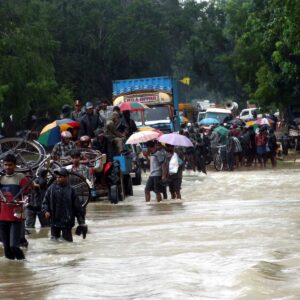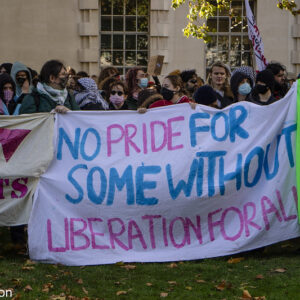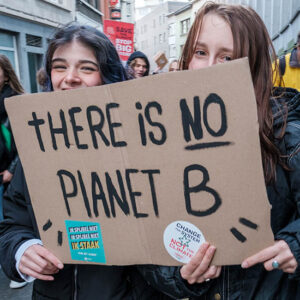Source >> Spectre Journal
The first is an updated Network appeal from April 19, 2023. The second is a statement from the Alliance of Demand-Based Campaigns (TAM), which has over seventy affiliates across Sudan ranging from workers’ organizations to campaigns for environment justice and refugee rights.
STATEMENT FROM THE MENA SOLIDARITY NETWORK (UPDATED APRIL 19, 2023)
Resistance Committees, trade unions, women’s organizations, and grassroots campaigns in Sudan are urgently appealing for solidarity and peace as rivalry between factions of the ruling military junta has turned into a deadly war in the capital Khartoum, neighboring cities of Omdurman and Bahri, and other major towns across the country. According to international media and eyewitness reports, fighters from the Sudanese Armed Forces and the Rapid Support Forces militia have engaged in gun battles and exchanged shell fire in crowded city streets, hitting schools, hospitals, and residential neighborhoods. The SAF was reported to have also attacked RSF positions with MiG and Sokhoi fighter jets.
Tens of thousands of civilians have been trapped by the fighting, including hospital patients who had to be evacuated under gunfire and hundreds of school children in Khartoum who were besieged in their classrooms. The UN said on Tuesday 18 April that at least 185 people had been killed and eighteen hundred injured. By the following day, confirmed deaths had risen to nearly three hundred. Meanwhile, Sudanese organizations reported that water and electricity systems were failing or inaccessible across parts of the capital.
The revolutionary movement in Sudan shows there is an alternative to this carnage. On 19 April, a list of forty-two Resistance Committees, trade unions, and workers’ and women’s organizations issued a statement calling for the “civil revolution forces” to take the initiative with a “comprehensive political strike.” According to Sudanese activists contacted by Middle East Solidarity, among the demands being raised in Sudan are calls not just for a ceasefire, but for the demilitarization of Sudanese cities and residential areas. Resistance Committees are also leading practical support on the ground despite the danger, organizing medical aid and food supplies.
What we think: our governments are complicit in this bloodshed, not bystanders
The two warring sides in this conflict are rival factions in the military junta which seized power in October 2021 from the civilian politicians who were their “partners” in the Transitional Government set up in the wake of dictator Omar al-Bashir’s fall in 2019. They have been armed to the teeth and given intelligence, diplomatic and financial support by regional powers Saudi Arabia, UAE, Egypt and Israel— all staunch allies of the major Western governments (and recipients of huge amounts of Western aid and arms). Both sides in the war have also courted Putin in Russia, who hopes to secure access to a new naval and military base in Sudan as a result.
Far from taking effective action to isolate the military and militia coup leaders, the US and British governments have repeatedly pushed Sudanese civilian movements towards negotiations with the military and militia leaders. The British government repeated this call in another statement issued on 15 April. This is in contradiction to the clear position adopted by the Resistance Committees and most trade unions and major civil society organizations, which reject any attempt to legitimize the military coup through negotiations.
Take urgent action now:
- Send a message to the Sudanese authorities via the Sudanese embassy in your country and by making a statement on social media, calling for an immediate ceasefire and the creation of safe passages to evacuate the wounded and provide emergency supplies.
- Call on the British, US, and other foreign governments to halt all arms transfers, military and diplomatic support to the Sudanese Armed Forces, Rapid Support Forces, AND the regional powers such as Saudi Arabia, UAE, Israel and Egypt which are fueling the conflict. They must rush humanitarian supplies to Sudan, confirm that they will cancel Sudan’s debts once the military junta is replaced by a democratic civilian government ,and that the military and militia leaders responsible for this bloodshed will not benefit from diplomatic immunity or be accorded any legitimacy whatsoever.
- Rush donations for medical supplies to the Sudan Doctors Union—UK appeal below. Circulate the detailed report on the critical situation for Sudanese health services that is included below.
- Share the messages from Sudanese organizations below widely—support their calls for a ceasefire, humanitarian aid and the demilitarization of Sudanese cities and residential areas.
- Join peace protests organized by Sudanese activists abroad—keep up to date via our Facebook page.
HEALTH SERVICES, MEDICAL PROFESSIONALS AND HOSPITALS ATTACKED
The ongoing clashes in Sudan have had a severe impact on the country’s healthcare system, as hospitals and medical staff have come under attack. The United Nations has reported that more than 180 people have been killed and eighteen hundred injured, while eyewitnesses have reported a large number of corpses in the streets.
Hospitals and healthcare institutions in Khartoum and other Sudanese cities have been subjected to shelling with artillery and firearms, causing extensive damage and forcing some facilities to shut down completely. This shelling constitutes a clear violation of international humanitarian law and agreements that stipulate the protection and neutralization of healthcare institutions from targeting.
The closure of pharmacies has made it difficult for women to obtain feminine care supplies and pads, as well as to reach hospitals for pregnant women or those about to give birth. Additionally, a pregnant woman and her father were killed in front of a hospital while trying to seek medical care and the child was miraculously rescued, while a number of doctors and healthcare workers were injured and killed.
The Sudanese Doctors’ Union has established online channels to help citizens seeking medical care by publishing online phone numbers for volunteer doctors across all specialities to provide help via phone calls and WhatsApp groups. They are also coordinating with resistance committees across the country to establish medical rooms for injury possibilities and to be prepared for any emergency.
The international community must compel the conflicting parties to cease targeting healthcare facilities, to open safe passages, and to allow ambulance vehicles to pass through. Additionally, humanitarian organizations should take urgent action to evacuate the wounded and provide medical supplies to those in need. The protection of healthcare workers, patients, and facilities must be a priority to ensure access to medical care for those who need it most.
The revolutionary movement in Sudan shows there is an alternative to this carnage… among the demands being raised in Sudan are calls not just for a ceasefire, but for the demilitarization of Sudanese cities and residential areas. Resistance committees are also leading practical support on the ground despite the danger, organizing medical aid and food supplies.
CALL FOR SOLIDARITY WITH THE SUDANESE PEOPLE: THE ALLIANCE OF DEMAND-BASED CAMPAIGNS
(APRIL 20, 2023)
Before the current catastrophic descent into the heavily armed battles between Sudan Armed Forces (SAF) and the paramilitary Rapid Support Forces (RSF), having its roots in the Janjaweed militia, the democratic transition in Sudan had already been stumbling in the military and paramilitary power struggle, and the humanitarian situation had already been dire, with sixteen million of the Sudanese population in need of urgent aid.
Now, civilians in the Capital districts and Darfur states are unprotected from heavy artillery and denied access to medical care, drinking water, electricity, and food supplies. Moreover, attacks on WFP and UNOCHA facilities and workers were reported in Darfur and against hospitals in Khartoum. The assaults, together with the run-out power sources and medical supplies, took thirty-nine Khartoum hospitals out of service, leaving only twenty hospitals with minimal operational capacity. Civilians in the Northern and Kurdufan states are under similar threats.
The rejection of war by the Alliance of Demand-Based Campaigns (TAM) is based on our fundamental position of human beings’ right to live safely and the right to life. TAM calls on Sudan friends, peace lovers around the globe, and the democratic world to solidarize with Sudanese people and support their aspirations expressed in Sudan’s revolution slogan; freedom, justice, and peace.
We demand:
- An immediate ceasefire
- Immediate humanitarian aid
- The demilitarization of Sudanese cities and all civilian-inhabited areas.
- The restoration of the path towards a democratic transition and support for the civil government once it takes place by canceling Sudan’s debt, establishing economic partnerships, and providing diplomatic support.
Furthermore, calling on your governments to prevent foreign interventions that provide arms, and logistic and intelligence support can help to avoid sliding into a civil war and a completely failed state.
The Alliance of Demand-Based Campaigns (TAM)
Office of External Relations
Read an interview with Khaled Taha from TAM here in the recent issue of Middle East Solidarity magazine
What you can do:
- Download this statement here
- Read more on the background here
- Send a message to the Sudanese authorities via the Sudanese embassy in your country and by making a statement on social media calling for an immediate ceasefire, and the creation of safe passages to evacuate the wounded and provide emergency supplies.
- Call on the British, US and other foreign governments to halt all arms transfers, military and diplomatic support to the Sudanese Armed Forces and Rapid Support Forces AND the regional powers such as Saudi Arabia, UAE, Israel and Egypt which are fueling the conflict. They must rush humanitarian supplies to Sudan, confirm that they will cancel Sudan’s debts once the military junta is replaced by a democratic civilian government, and confirm that the military and militia leaders responsible for this bloodshed will not benefit from diplomatic immunity or be accorded any legitimacy whatsoever.
- Rush donations for medical supplies to the Sudan Doctors Union—UK appeal here.
- Share the messages from Sudanese organizations detailed here widely—support their calls for a ceasefire, humanitarian aid, and the demilitarization of Sudanese cities and residential areas.
- Join peace protests organized by Sudanese activists abroad—keep up to date via our Facebook page.
Art Book Review Books Campism Capitalism China Climate Emergency Conservative Government Conservative Party COVID-19 Creeping Fascism Economics EcoSocialism Elections Europe Far-Right Fascism Film Film Review Fourth International France Gaza History Imperialism Iran Israel Italy Keir Starmer Labour Party Long Read Marxism Marxist Theory Migrants Palestine pandemic Police Protest Russia Solidarity Statement Trade Unionism Ukraine United States of America War Women
The Anti*Capitalist Resistance Editorial Board may not always agree with all of the content we repost but feel it is important to give left voices a platform and develop a space for comradely debate and disagreement.
Latest articles
- Alienation and barbarism on showDave Kellaway reviews Encounters, an exhibition featuring the work of Giacometti and the British-Palestinian artist, Mona Hatoum. At the Barbican Centre, London, until 11th January
- Beyond Appearances, Trans SolidarityThe idea of policing single-sex spaces based on appearances is deeply regressive,.Echo Fortunemakes the case for urgent solidarity.
- Urgent call for solidarity: support Sri Lanka’s flood and landslide relief effortsThis appeal comes from the Socialist People’s Forum, Sri Lankan organisation of the Fourth International. ACR has made a direct donation and we are also asking readers who can to send donations via our account ( to minimise bank charges.)
- I promise that I will (not) obey in advanceLast week, two major UK organisations, Girlguiding and the Women’s Institute, gave in to the anti-trans movement and announced that they would no longer be accepting trans women and girls as members, explains Alice Nuttall.
- COP 30: entrenching the crisis of climate politicsHow has COP 30 failed to address the climate catastrophe? Brian Ashley looks at the continued crisis of political solutions to ecological disaster.






